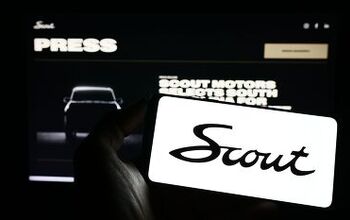Editorial: Between the Lines: GM Does Not Welcome Its New Governmental Overlords
Well, the worm has turned properly on government intervention in the auto industry, as General Motors now seems to fear a government takeover more than bankruptcy. Too bad the choice isn’t either-or. Recent 10-Q filings with the SEC indicate that GM accepts the inevitability of a Chapter 11 filing, but describes the ramifications of a possible government ownership stake with fear and horror. “In the future we may also become subject to new and additional government regulations regarding various aspects of our business as a result of the U.S. government’s ownership in (and financing of) our business. These regulations could make it more difficult for us to compete with other companies that are not subject to similar regulations,” figure GM’s professional worrywarts. These still waters of paranoia run deep.
“To the extent the U.S. Treasury elects to exercise influence or control over us, its interests (as a government entity) may differ from those of our other stockholders,” goes the GM line of thinking. Considering the Treasury and UAW VEBA trust will hold 89 percent of New GM’s equity following the proposed debt swap, the “other stockholders” would hold an 11 percent stake at most. A voting majority that ain’t. So what’s the problem?
“In addition, the U.S. Treasury’s ability to prevent any change in control of us could also have an adverse effect on the market price of our common stock. The U.S. Treasury may also, subject to applicable securities laws, transfer all or any of its portion of our common stock to another person or entity and, in the event of such a transfer, that person or entity could become the controlling stockholder.”
By the wounded tone, you’d think GM had never even considered doing something as sneaky as, say, diluting 90 percent of its stock to a one percent equity position. In order to give a controlling stake to (wait for it) VEBA and the US Treasury. It sounds like Sergio Marchionne is haunting someone’s nightmares.
“We currently are in discussions with the U.S. Treasury regarding the governance of our company following consummation of the exchange offers and therefore we cannot assure you as to what role the U.S. Treasury will play. Absent other arrangements, as a result of its ownership of our common stock, the U.S. Treasury will be able to elect all of our directors and to control the vote on substantially all matters brought for a stockholder vote. In addition, through its stockholder voting rights and election of directors, and its role as a significant lender to us, the U.S. Treasury will be able to exercise significant influence and control over our business if it elects to do so.”
Boo-freaking-hoo. You gotta serve somebody, as the poet once said, and taking bailout bucks makes the government master of your fate. It’s one thing to ask the government to be a lender of last resort, but it’s quite another to ask said lender to ignore its fiduciary responsiblity. Y’know, more than it already has.
Meanwhile, GM hasn’t served its stockholders well for years, as witnessed by the current, lamentable value of GM stock. The fact that it is also willing to diss its stockholders with a 100-1 reverse split speaks volumes about the sincerity of GM’s hypothetical crocodile tears.
Besides, later in the filing, GM admits that “Even if we successfully consummate the exchange offers, our indebtedness and other obligations will continue to be significant.” Why? Supplier failure, VEBA cash needs (even if VEBA takes equity), weak sales and more. Where’s that money coming from again? Not only is GM seeking an open-ended commitment from the Treasury, it also wants no strings attached. And even though GM desperately needs to be saved from itself, the Treasury seems almost too willing to allow GM to fall back into its old habits. To wit:
Although the agreements governing certain of our indebtedness, including the U.S. Treasury Loan Agreement, contain restrictions on the incurrence of additional indebtedness, these restrictions are subject to a number of qualifications and exceptions, and the indebtedness incurred in compliance with these restrictions could be substantial. If we or our subsidiaries incur additional indebtedness, the risks associated with our substantial leverage would increase.
Having heard the Chrysler in the coal mine start singing in Italian (and lose half its ad budget), it’s not entirely surprising that GM would be wary of government control of its operations. But if the $16.3 billion we’ve dumped into GM so far doesn’t buy the government a certain amount of control, then the tens of billions we will continue to dump over our “at least two year” ownership of GM certainly will.
Sure, there’s a question of whether the Treasury will force GM to build eco-freak-mobiles that nobody will buy. But that would be a problem for the GAO and other taxpayer advocates. Or, a possibility that should have been considered before the rush to bailout. Besides, if GM had its finger on the pulse of the American car market, we wouldn’t be having this discussion right now, would we?
Again and again, GM betrays the belief that its only problem is liquidity. If an organization is so blind to its own structural problems, how could partial government ownership make the situation any worse?
More by Edward Niedermeyer
Latest Car Reviews
Read moreLatest Product Reviews
Read moreRecent Comments
- Zipper69 "At least Lincoln finally learned to do a better job of not appearing to have raided the Ford parts bin"But they differentiate by being bland and unadventurous and lacking a clear brand image.
- Zipper69 "The worry is that vehicles could collect and share Americans' data with the Chinese government"Presumably, via your cellphone connection? Does the average Joe in the gig economy really have "data" that will change the balance of power?
- Zipper69 Honda seem to have a comprehensive range of sedans that sell well.
- Oberkanone How long do I have to stay in this job before I get a golden parachute?I'd lower the price of the V-Series models. Improve the quality of interiors across the entire line. I'd add a sedan larger then CT5. I'd require a financial review of Celestiq. If it's not a profit center it's gone. Styling updates in the vision of the XLR to existing models. 2+2 sports coupe woutd be added. Performance in the class of AMG GT and Porsche 911 at a price just under $100k. EV models would NOT be subsidized by ICE revenue.
- NJRide Let Cadillac be Cadillac, but in the context of 2024. As a new XT5 owner (the Emerald Green got me to buy an old design) I would have happy preferred a Lyriq hybrid. Some who really like the Lyriq's package but don't want an EV will buy another model. Most will go elsewhere. I love the V6 and good but easy to use infotainment. But I know my next car will probably be more electrified w more tech.I don't think anyone is confusing my car for a Blazer but i agree the XT6 is too derivative. Frankly the Enclave looks more prestigious. The Escalade still has got it, though I would love to see the ESV make a comeback. I still think GM missed the boat by not making a Colorado based mini-Blazer and Escalade. I don't get the 2 sedans. I feel a slightly larger and more distinctly Cadillac sedan would sell better. They also need to advertise beyond the Lyriq. I don't feel other luxury players are exactly hitting it out of the park right now so a strengthened Cadillac could regain share.


































Comments
Join the conversation
some good points made in the comments so far. however, let us not forget the most overlooked reason, why gm has no right to complain about government intervention: LOBBYISTS. apparently it's ok for gm to throw billions of dollars at high priced lobbyists over the years to bribe lawmakers to cater laws to their company and industry, so that they can yield higher profits at the expense of smaller companies and more importantly the environment. yet when the government throws billions at them to save their unethical behinds, suddenly the government doesn't have a say? so according to gm, it's ok for government to intervene only when it involves "behind-the-scenes" deceit, and not ok when it involves "in-the-public-eye", good will aid? we've had the technology and know-how to build efficient electrical cars at normal cost for nearly 75 years, but there is more money to be made producing vehicles the way they are produced now. ESPECIALLY when you throw in the impact of the oil industry and their lobbyists. who cares about the environment and out descendants future, right?? don't mean to single out gm and the entire auto industy, as this obviously occurs in all industries. financial and synthetic chemical / pharmaceutical industries are possibly the worst. and people wonder why democrats want regulation...